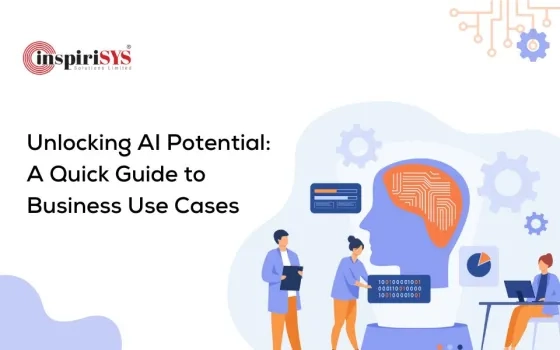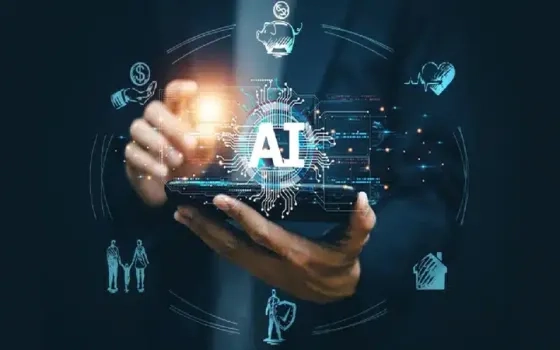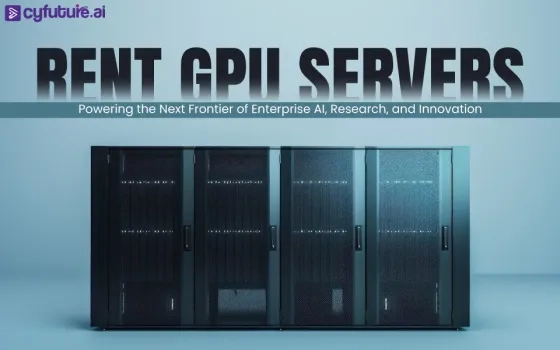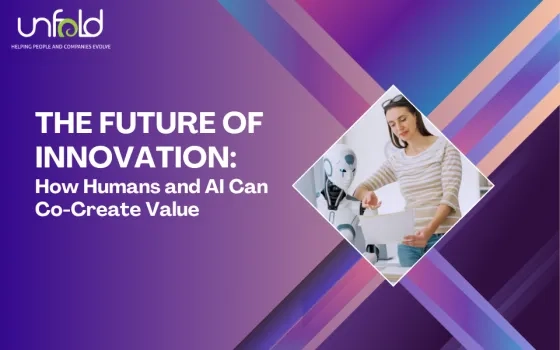Artificial Intelligence has taken the world by storm. It is astounding to consider that the machines that were once silent now possess the ability to interact with us humans. From operational efficiency to revolutionising customer management, creative writing and innovation, AI has truly become the jack of all trades. Witnessing how Artificial Intelligence is transforming the way business functions in today’s age is no less than a fascinating roller coaster ride.
Enterprises across the globe are implementing AI-driven processes in a variety of ways. To gain a better understanding of AI in practical applications, we present to you the most popular use cases of AI in business, where organisations strategically choose to supercharge their business processes.
The Top Twelve AI Use Cases
1. Superior Customer Service:
AI is now essential for customer service operations, enabling organizations to guarantee customers receive the assistance they require while also lightening the workload for service representatives and call centres. During the COVID-19 pandemic, Lufthansa group faced an influx of customer queries about cancelled flights. This pushed the company to expedite its moves by using an AI-powered customer automation platform and solve customer issues.
Voice-based queries utilize natural language processing (NLP) and sentiment analysis in speech recognition to start conversations promptly. Through machine learning algorithms, AI comprehends both the content and tone of customer queries, efficiently guiding them to customer service agents as required.
AI proves highly effective in generating personalized experiences on a large scale via chatbots, digital assistants, and customer interfaces. This enables the delivery of tailored experiences and targeted advertisements to customers and end-users. For instance, Amazon utilizes AI to suggest reordering frequently purchased items to customers and provide related product recommendations or suggestions.
2. Process Automation:
AI is utilized to automate tasks that usually require significant time and are susceptible to mistakes when done manually. Through automation, AI allows organizations to allocate human resources to tackle more intricate projects, enhancing productivity and efficiency.
Various industries are harnessing the power of automation to streamline operations and improve efficiency. In healthcare, intelligent automation, coupled with natural language processing (NLP), ensures a consistent approach to data analysis, diagnosis, and treatment.
Insurance providers leverage AI to eliminate manual rate calculations and simplify claims processing, while financial institutions utilize AI-powered FinOps to optimize cloud spending decisions, balancing cost and performance effectively.
Banking sectors benefit from AI's ability to detect suspicious transactions, enhancing security measures. In manufacturing, advanced AI technologies generate predictive insights on market trends and expedite product design by offering multiple design options. These advancements signify a shift towards a more automated and data-driven approach across various industries.
3. AI in Education:
Teachers and trainers can leverage AI tools, where students can benefit from personalised learning platforms, intelligent language learning apps, adaptive learning tools, etc. Whereas teachers can benefit from intelligent scheduling, course planning, classroom management tools, curriculum design tools, student progress analytics platforms, etc. Institutions can benefit from admission management platforms, enrollment management and forecasting tools, campus safety and security tools and many more.
Duolingo is one AI-powered educational and innovative platform, where a friendly green owl mascot engages learners through personalized interactions. It begins with a skill assessment test, modifying activity difficulty based on user performance to maintain an optimal level of challenge. Through a point-based reward system, learners are motivated to progress consistently.
Similarly, StepWise, developed by Querium, aims to revolutionize STEM learning using AI analytics. By accurately assessing student progress, the platform tailors instruction to individual learning needs, identifying and addressing difficult concepts with machine learning algorithms. StepWise offers a comprehensive suite of tools, such as interactive lessons, adaptive quizzes, and real-time feedback, ensuring sustained engagement and effective learning outcomes.
4. Cloud Pricing Optimization:
Organizations are increasingly relying on artificial intelligence to reduce cloud expenses and find economical methods to run cloud applications. For instance, Airbnb employs AI to enhance pricing strategies on AWS, utilizing it to oversee capacity, develop tailored tools for cost and usage data analysis, and optimize storage and computing resources efficiently. This approach helps organizations to manage their cloud expenditures and maximize the value derived from cloud services.
5. Unique Uptime and Reliability
Ever wondered how giant companies like Uber, Facebook, AirBnB and others maintain uptime and reliability? These companies started implementing AI to monitor and keep their services available for their customers. AI helps these organizations by continuously scanning systems, identifying inefficiencies and potential disruptions and detecting impending threats, which is humanly impossible.
6. Recruiting/Hiring:
Did you know that many organizations now use AI to streamline the hiring process? From screening resumes to matching candidates with the perfect role, AI is transforming recruitment. It can also conduct initial online assessments and analyze candidates' performance in video interviews. Take Unilever, for instance, processing over 1.8 million job applications yearly. They've teamed up with Pymetrics to assess candidates through video software, analysing everything from body language to word choice. With the help of AI, organizations are saving time, reducing manual labour, and making smarter hiring decisions faster than ever before.
7. IT Operations Management:
As per OpsRamp report 2023, 70% of enterprises are using AIOps platforms for intelligent alerting, 50% of enterprises for root cause analysis, 57% for anomaly and threat detection, 50% for incident auto-remediation and 27% for capacity optimisation. In a leading-edge move, Delta Airlines created a digital simulation of its operations, enabling its new system to recommend the optimal solutions for minimizing disruptions. Running an airline is no easy feat, especially when faced with challenges like bad weather. With this innovation, staff can efficiently manage aircraft swaps, crew schedules, and passenger connections, ensuring smoother operations even in adverse conditions.
8. Clean up with Predictive Maintenance:
AI plays a crucial role in predictive maintenance. With the help of data analysis and machine learning techniques, it predicts and identifies machinery problems and signals necessary maintenance actions. It is also utilised to improve mechanical efficiency and reduce carbon emissions in engines. For instance, Rolls-Royce, the luxurious car brand leverages AI by employing predictive maintenance. They're boosting jet engine efficiency, reducing carbon emissions, and ensuring smoother maintenance schedules through cutting-edge predictive analytics.
9. Safety and Quality:
AI aids organizations in automating safety and quality checks, minimizing risks to both the company and consumers while enhancing the standard of products and services. Furthermore, AI can be embedded into products to bolster their safety and user protection. Google, for instance, has integrated AI safety features into its Nest product range, enabling it to detect intruders, smoke, or carbon monoxide. Additionally, AI helps discern whether an alert signifies a genuine emergency or a false alarm, enhancing overall safety and user experience.
The power of AI, and machine learning (ML) opens a realm of possibilities in cybersecurity. From facial recognition for secure authentication to dynamic fraud detection, AI-driven antivirus programs identify and block malware, and use reinforcement learning for adeptly responding to cyber threats. AI's classification algorithms proficiently identify anomalies and phishing attempts, ensuring robust cybersecurity across the board.
10. Coding and App Modernization:
Big firms embrace generative AI for modernizing applications and enterprise IT tasks, automating coding, deployment, and scaling. Developers can simply input coding commands as plain English sentences via a natural-language interface, receiving auto-generated code in return. This method empowers hybrid cloud developers, regardless of expertise, to efficiently migrate and modernize legacy application code at scale. The result? Code consistency, fewer errors, and accelerated speed in transitioning to new target platforms.
11. AI-Powered Computer Vision:
AI-powered computer vision boasts a plethora of applications across diverse industries, transforming the way we perceive and interact with the world around us. In healthcare, it acts as a silent hero diagnosing diseases from medical images and keeping a vigilant eye on patient health. Whereas, in retail, it's orchestrating seamless shopping experiences, from smart shelves that know when to restock to checkout lines that vanish before your eyes. Picture a future where self-driving cars navigate bustling streets with ease, factories churn out flawless products with precision, and fields yield bountiful harvests with minimal intervention—all guided by the watchful gaze of computer vision. From enhancing security and surveillance to revolutionizing entertainment with immersive experiences, the possibilities are limitless.
12. Workforce Schedule Optimization
Optimising workforce schedules has become effortless with the help of AI. It allows organizations to streamline operations that previously consumed significant managerial time. Here AI considers various factors like employee availability, customer traffic, and employee skills and preferences simultaneously to determine the optimal schedule. Major corporations including Walmart, Starbucks, Costco, Delta Airlines, Target, and others leverage this technology to tailor schedules according to the organization’s requirements.
Conclusion
Isn’t AI a miraculous tool? The versatility of AI and its transformative potential is evident in the above use cases from various industries. AI has a lot to offer more than what is represented in a high-budgeted Sci-fi movie. This collaborative potential of human expertise and AI capabilities can benefit enterprises, which will allow them to unlock patterns and trends, drive strategic decision making and gain a competitive edge. Is your organization yet to explore and adopt AI? Then, hurry up! Don’t wait for your competitors to leave you behind.




























